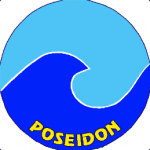Προγράμματα
Προγράμματα
Metrology for Integrated Marine Management and Knowledge-Transfer Network – MINKE
MINKE will integrate key European marine metrology research infrastructures, to coordinate their use and development and propose an innovative framework of “quality of oceanographic data” for the different European actors in charge of monitoring and managing the marine ecosystems. MINKE proposes a new vision in the design of marine monitoring networks considering two dimensions of data quality, accuracy and completeness, as the driving components of the quality in data acquisition. This new vision will be framed in a quintuple helix model of innovation, incorporating all the elements involved in the monitoring network design:
- the context (ocean health), identifying the Essential Ocean variables (EOVs) as the key parameters to monitor
- the civil society (NGO, Makers community, Social media and Citizen Science platforms) as the key actors to ensure data completeness
- the academia researching new methods to ensure the accuracy and the global quality of the final products, developing tools for integrating the information of top-qualified oceanographic instruments and low-cost instrumentation.
- the industry improving the performance of the observations with new instrumentation, data-transmission systems and cost-effective technologies
- the governments that provide the legal and socio-economic frameworks to develop the proposed network
The present proposal, through the different Integration Activities (Networking, Transnational-Virtual Access and Joint Research), aims to lay the groundwork for creating the necessary synergies among the different involved actors in the quintuple helix model of innovation, creating a new community with complementary capabilities for Ocean & Coastal Observation, that will facilitate the transition towards a blue growth socio-economic system.
Προϋπολογισμός ΕΛΚΕΘΕ: 231.461 €
Χρηματοδότηση: EU, H2020
Διάρκεια: 2021 - 2025
Λογότυπο:
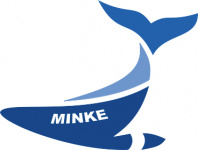
JERICO-S3 will provide a state-of-the-art, fit-for-purpose and visionary observational Research Infrastructure (RI), expertise and high-quality data on European coastal and shelf seas. The project will support world-class research, high-impact innovation and a window of European excellence worldwide.
It will be structured regionally around 4 Pilot Super Sites (PSS) and 5 Integrated Regional Sites (IRS). Through this innovative structure, JERICO-S3 is targeting a more integrative approach to better observe the coastal ecosystem, raising up the scientific excellence and developing the potential of the different sites, with consideration of the regional and local ecosystems.
The preliminary development of an e-infrastructure (VRE, Virtual Research Environment) will support scientists and users by offering access to dedicated services and help progress on the design of the RI and its strategy for sustainability. Major user-driven improvements will be realised in terms of observing the complexity of coastal seas and continuous observation of the biology, access to facilities, data and services, best practices and performance indicators, innovative monitoring strategies, and cooperation with other European RIs.
Επιστημονικός Υπεύθυνος ΕΛΚΕΘΕ: Dr. George Petihakis
Προϋπολογισμός ΕΛΚΕΘΕ: 495.000 €
Χρηματοδότηση: EU, H2020
Διάρκεια: 2020 - 2024
Λογότυπο:
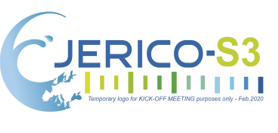
The overarching goal of ENVRI-FAIR is to advance the findability, accessibility, interoperability, and reusability (FAIRness) of the data and services offered by the ENVRI Cluster research infrastructures and to connect them to the emerging European Open Science Cloud. HCMR’s IO is participating in this initiative under the umbrella of EMSO ERIC and together with the other members of EMSO RI will implement procedures that will increase the FAIRness of the data that are collecting through the EMSO observatories.
Επιστημονικός Υπεύθυνος ΕΛΚΕΘΕ: Leonidas Perivoliotis
Προϋπολογισμός ΕΛΚΕΘΕ: 57.825 €
Χρηματοδότηση: Διάρκεια: 2020 - 2023
Λογότυπο:
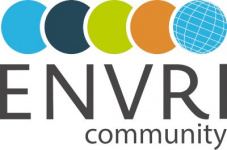
Underwater and surface drones, in particular gliders, have become essential vehicles to carry scientific payloads for most environmental observations from the surface down to 6000m and for activities supporting the blue economy. Their major advantages are being mobile, steerable, persistent and usable in large numbers and at relatively low costs. However, the distributed infrastructure required to exploit these assets must be able to meet different demands from research and monitoring of the marine environment, to public service missions and industry needs, requiring customised payloads and operations. The rapid evolution of such technologies (robotics, artificial intelligence, sensors, big data) requires that the R&D resources offered by this distributed infrastructure continuously adapt to users’ demands.
The complex hardware and information technology characteristics of such a distributed European infrastructure, optimizing access to resources and R & D for gliders, were analysed during the GROOM-FP7 design study from the perspective of research and the Global and (future) European Ocean Observing System (GOOS & EOOS) needs. Since then, several “gliderports” have developed which has fostered a corresponding European industrial innovative sector.
GROOM II, building on its predecessor, will deliver the decision basis for an advanced MRI that promotes scientific excellence, fosters innovation, support the blue economy, builds industrial and public partnerships, and works towards helping achieve the common research and innovation mission for future Europe. The project will define the overall organization of an infrastructure dedicated to ocean research and innovation, and maritime services supporting Blue Growth.
This infrastructure will be a positive step against today’s fragmented European landscape, aiding connections and synergies for the completion of GOOS and EOOS.
Προϋπολογισμός ΕΛΚΕΘΕ: 187.000 €
Χρηματοδότηση: EU, H2020
Διάρκεια: 2020 - 2023
Λογότυπο:
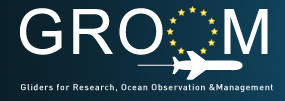
Exerted pressures on the ocean and more particularly on the coastal and shelf seas increasingly disturb increasingly disturb coastal regions and ecosystems, and will strongly impact our future. To improve the understanding of underlying processes, the series of EU-funded JERICO (Joint European Research Infrastructure of Coastal Observatories) projects have consisted, since 2007, in continuously improving observations in European coastal marine areas where most of the world population lives, with the objective to build a pan-European Research Infrastructure (RI) providing high-quality marine data, expertise, services, facilities and observation systems. The data produced in this long-term framework are multidisciplinary, standardized, quality-controlled, sustained, interoperable, and free for access and use. However, to better serve the scientific community and address societal and policy needs, JERICO has to progress towards a structured operational European RI supported by the EU Member States (and associated members) and the EC, and endorsed as a high-value RI at EU level as part of the ESFRI roadmap. JERICO-DS will thus analyze the needs and propose a design for a state-of-theart, fit-for-purpose, visionary and sustainable observational European RI providing expertise and high-quality data on European coastal and shelf seas, supporting world-class research, high-impact innovation, and visibility of European excellence worldwide. JERICO-DS will conceptually design the entire picture of the JERICO RI, covering both hardware and software components, and including cutting edge technologies from the sensor level to the information and service distribution to users, hence contributing to the Smart Ocean. JERICO-DS will build on nations’ will and involvement to co-construct the JERICO RI, from the scientific and technical design to the business plan and governance strategy, supporting future engagement during the ESFRI process.
Επιστημονικός Υπεύθυνος ΕΛΚΕΘΕ: Leonidas Perivoliotis
Προϋπολογισμός ΕΛΚΕΘΕ: 142.000 €
Χρηματοδότηση: EU, H2020
Διάρκεια: 2020 - 2023
Λογότυπο:
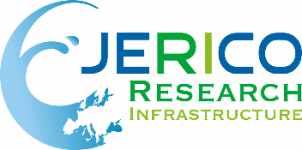
Improving and Integrating European Ocean Observing and Forecasting Systems for Sustainable use of the Oceans (EuroSea)
Although the Ocean is a fundamental part of the global system providing a wealth of resources, there are fundamental gaps in ocean observing and forecasting systems, limiting our capacity in Europe to sustainably manage the ocean and its resources. Ocean observing is “big science” and cannot be solved by individual nations; it is necessary to ensure high-level integration for coordinated observations of the ocean that can be sustained in the long term. EuroSea brings together key European actors of ocean observation and forecasting with key end users of ocean observations, responding to the Future of the Seas and Oceans Flagship Initiative. Our vision is a truly interdisciplinary ocean observing system that delivers the essential ocean information needed for the wellbeing, blue growth and sustainable management of the ocean. The project will strengthen the European Ocean Observing System (EOOS) and support the Global Ocean Observing System (GOOS) and its partners. EuroSea will increase the technology readiness levels (TRL) of critical components of ocean observations systems and tools, including improved: European and international coordination; design of the observing system adapted to European needs; in situ observing networks; data delivery, integration of remote and in-situ data; and forecasting capability. EuroSea will work towards integrating individual observing elements to an integrated observing system, and will connect end-users with the operators of the observing system and information providers. EuroSea will demonstrate the utility of the European Ocean Observing System through three demonstration activities focused on ocean health, climate, and operational services, where a dialogue between actors in the ocean observing system will guide the development of the services, including market replication and innovation supporting the development of the blue economy.
Επιστημονικός Υπεύθυνος ΕΛΚΕΘΕ: George Petihakis
Προϋπολογισμός ΕΛΚΕΘΕ: 48.750 €
Χρηματοδότηση: EU, H2020
Διάρκεια: 2019 - 2023
Λογότυπο:
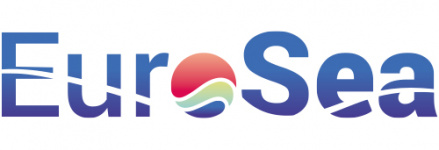
The overarching objective of Euro-Argo RISE (Euro-Argo Research Infrastructure Sustainability and Enhancement) is to enhance and extend the capabilities of the Argo network, to provide essential ocean observations, to answer new societal and scientific challenges, and support 1) ocean and climate change research, 2) climate change monitoring (characterizing climate change impact on the ocean physics and chemistry, 3) seasonal and climate change forecasting by improving the 4D description of the ocean state, 4) ocean analysis and forecasting and associated ocean services including Copernicus Services.
In addition, the project’s main target is to reinforce the development of the European Research Infrastructure Euro-Argo ERIC, which is a part of the ESFRI roadmap, supporting its economic and operational viability and gaining the trust and awareness of users.
Under the framework of Euro-Argo RISE HCMR is leading Task 6.1 which objective is the promotion and expansion of Argo in the Mediterranean and Black Seas, and Task 8.1 which objective is to develop links with other ERICs and research communities and to define strategy in collaboration with other networks for shelf-open ocean boundaries. Furthermore HCMR contributes in WP7 activities on the promotion and improvement of the data access and usage of Argo, on the investigation of the potential links with the national MSFD implementation, and the enhancement of the Argo educational activities.
Επιστημονικός Υπεύθυνος ΕΛΚΕΘΕ: Dr. Dimitris Kassis
Προϋπολογισμός ΕΛΚΕΘΕ: 133.625 €
Χρηματοδότηση: EU, H2020
Διάρκεια: 2019 - 2022
Λογότυπο:
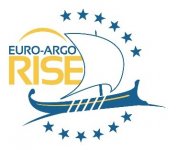
MEDITERRANEAN – MONITORING FORECASTING CENTRE (MED MFC) PHASE II
The Mediterranean – Monitoring Forecasting Centre (MED MFC) aims to provide regular and systematic information about the physical state of the ocean and marine ecosystems for the Mediterranean Sea. The system is based on a numerical ocean model, which assimilates in situ and satellite data. A main purpose of MED MFC is to be an expert centre for ocean analyses and forecasts in the Mediterranean Sea. It gathers expertise and knowledge in the field of the regional Mediterranean Sea dynamics (from waves to currents and biogeochemistry), it is an interface with local data collection networks, and it enhances technical links with other CMEMS components. Moreover, MED MFC’s objectives include the planning and efficient implementation of systems upgrades, products quality, and support to the production of the Ocean State Report (OSR) and Ocean Monitoring Indicators (OMI).
Phase II advances the work and implementations started during phase I
Επιστημονικός Υπεύθυνος ΕΛΚΕΘΕ: Dr. Gerasimos Korres
Προϋπολογισμός ΕΛΚΕΘΕ: 680.000 €
Χρηματοδότηση: Mercator Ocean
Διάρκεια: 2018 - 2021
Λογότυπο:
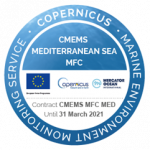
The Copernicus Med InSitu TAC (General Presentation) is the component of the Copernicus Marine Service which ensures a consistent and reliable access to a range of in situ data for the purpose of service production and validation. CMEMS In Situ TAC has two main objectives: a.) To collect multi-source, multi-platform, heterogenous data, perform consistent quality control and distribute it in a common format (NetCDF) and in near-real-time (within 24 hours) to the CMEMS Marine Forecasting Centres (MFC), for assimilation into their numerical ocean models, b.) To supply the MFCs and downstream users with re-processed 25-50-year products in delayed mode. In addition to the near-real-time products, these delayed-mode products are useful for model validation or assimilation in ocean reanalysis and climate studies. HCMR/IO has the responsibility for the operation of the Mediterranean component of the CMEMS InSitu TAC
Phase II advances the work and implementations started during phase I
Επιστημονικός Υπεύθυνος ΕΛΚΕΘΕ: Leonidas Perivoliotis
Προϋπολογισμός ΕΛΚΕΘΕ: 455.000 €
Χρηματοδότηση: Mercator Ocean
Διάρκεια: 2018 - 2021
Λογότυπο:
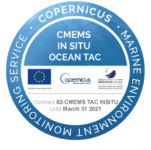
The Hellenic Integrated Marine Inland water Observing, Forecasting and offshore Technology System (HIMIOFoTS) includes integrated approaches in Marine observation and forecasting systems, coastal monitoring and an innovative Hydro-Environmental Monitoring and information Network. The infrastructure incorporates the following interrelated components: (a) The Hellenic Integrated Marine Observing and Forecasting System (HIMOFS), a cluster of already-existing and under-implementation marine observing systems coupled with a full range of forecasting operational models. (b) The Open Hydrosystem Information Network, an integrated information infrastructure for the collection, management and free dissemination of hydrological and environmental information related to the inland waters of the country.
ΕΥ ΕΛΚΕΘΕ - Συντονιστής Προγράμματος: Leonidas Perivoliotis
Προϋπολογισμός ΕΛΚΕΘΕ: 2.800.000 €
Χρηματοδότηση: GRST, EPanEK
Διάρκεια: 2017 - 2021
Λογότυπο:
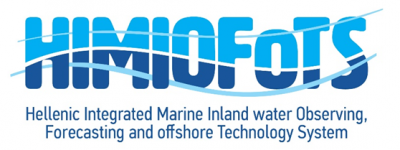
European Multidisciplinary Seafloor and water column Observatory (EMSO)
EMSO pursues the long-term objective to be part of the upcoming European Ocean Observing System (EOOS), which is expected to integrate multiple platforms and data systems, including other ERICs, to achieve the first sustained, standardized and permanent observatory network of the European seas. EMSO ERIC coordinates the access to the facilities and supports the management of data streams from EMSO observatories.
EMSO-Link has been designed to accelerate the establishment of EMSO ERIC governance rules and procedures and will facilitate the coordination of EMSO infrastructure construction, operation, extension and maintenance.
Επιστημονικός Υπεύθυνος ΕΛΚΕΘΕ: Dr. George Petihakis
Προϋπολογισμός ΕΛΚΕΘΕ: 558.000 €
Χρηματοδότηση: EU, H2020
Διάρκεια: 2017 - 2020
Λογότυπο:
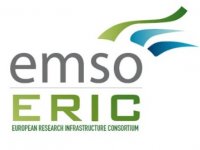
BigDataOcean (BDO) was a 30-month H2020-RIA project started in January 2017, aiming to capitalize on modern technological innovations and revolutionize the way maritime-related industries work. Its main objective was to deliver maritime big data scenarios for the benefit of EU-based companies, organizations, and scientists. In order to achieve this, a multi-segment platform has been developed, in which various data of different velocity, variety, and volume are combined in an inter-linked, multilingual system, constituting a big-data repository of high value for the end user. HCMR contributed to the project by implementing the Mare Protection Pilot. This service provides the operational tools – POSEIDON Oil Spill Model –, which can offer essential information for the effective management in case of oil spill pollution in the sea.
Επιστημονικός Υπεύθυνος ΕΛΚΕΘΕ: Leonidas Perivoliotis
Προϋπολογισμός ΕΛΚΕΘΕ: 271.000 €
Χρηματοδότηση: EU, H2020
Διάρκεια: 2017 - 2019
Λογότυπο:
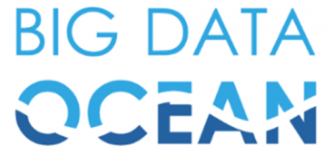
In the continuity of JERICO (FP7), the objective of JERICO-NEXT consisted in strengthening and enlarging a solid and transparent European network in providing operational services for the timely, continuous and sustainable delivery of high quality environmental data and information products related to marine environment in European coastal seas. The vision was to improve and innovate the cooperation in coastal observatories in Europe by implementing the coastal part of a European Ocean Observing System, to cooperate with other European initiatives as ESFRI (EURO-ARGO, EMSO, EMBRC), Integrated Infrastructures (FIXO3 etc.), OCEAN OF TOMORROW sensors innovation project (SenseNET, NEXOS), the emerging European biological network (EMBRC) and EMODnet to contribute to provide services to the research community and the society.
Επιστημονικός Υπεύθυνος ΕΛΚΕΘΕ: Dr. George Petihakis
Προϋπολογισμός ΕΛΚΕΘΕ: 851.850 €
Χρηματοδότηση: EU, H2020
Διάρκεια: 2015 - 2019
Λογότυπο:
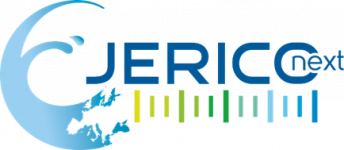
MEDITERRANEAN – MONITORING FORECASTING CENTRE (MED MFC) PHASE I
The Mediterranean – Monitoring Forecasting Centre (MED MFC) aims to provide regular and systematic information about the physical state of the ocean and marine ecosystems for the Mediterranean Sea. The system is based on a numerical ocean model, which assimilates in situ and satellite data. A main purpose of MED MFC is to be an expert centre for ocean analyses and forecasts in the Mediterranean Sea. It gathers expertise and knowledge in the field of the regional Mediterranean Sea dynamics (from waves to currents and biogeochemistry), it is an interface with local data collection networks, and it enhances technical links with other CMEMS components. Moreover, MED MFC’s objectives include the planning and efficient implementation of systems upgrades, products quality, and support to the production of the Ocean State Report (OSR) and Ocean Monitoring Indicators (OMI).
Επιστημονικός Υπεύθυνος ΕΛΚΕΘΕ: Dr. Gerasimos Korres
Προϋπολογισμός ΕΛΚΕΘΕ: 440.000 €
Χρηματοδότηση: Mercator Ocean
Διάρκεια: 2015 - 2018
Λογότυπο:
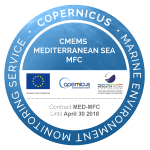
The Copernicus In Situ TAC (General Presentation) is the component of the Copernicus Marine Service which ensures a consistent and reliable access to a range of in situ data for the purpose of service production and validation. CMEMS In Situ TAC has two main objectives: a.) To collect multi-source, multi-platform, heterogenous data, perform consistent quality control and distribute it in a common format (NetCDF) and in near-real-time (within 24 hours) to the CMEMS Marine Forecasting Centres (MFC), for assimilation into their numerical ocean models, b.) To supply the MFCs and downstream users with re-processed 25-50-year products in delayed mode. In addition to the near-real-time products, these delayed-mode products are useful for model validation or assimilation in ocean reanalysis and climate studies. HCMR/IO has the responsibility for the operation of the Mediterranean component of the CMEMS InSitu TAC
Επιστημονικός Υπεύθυνος ΕΛΚΕΘΕ: Leonidas Perivoliotis
Προϋπολογισμός ΕΛΚΕΘΕ: 354.000 €
Χρηματοδότηση: Mercator Ocean
Διάρκεια: 2015 - 2018
Λογότυπο:
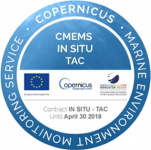
The EMSODEV general objective was to catalyze the full operations of the EMSO distributed Research Infrastructure, through the development and deployment of the EMSO Generic Instrument Module (EGIM). EGIM implemented to provide accurate, consistent, comparable, long-term measurements of ocean parameters, which are key to addressing urgent societal and scientific challenges (e.g. climate change and hazards). This led to an increased interoperability of EMSO nodes and to the common collection of ocean essential variable time series.
Επιστημονικός Υπεύθυνος ΕΛΚΕΘΕ: Dr. Vasileios Lykousis
Προϋπολογισμός ΕΛΚΕΘΕ: 200.000 €
Χρηματοδότηση: EU, H2020
Διάρκεια: 2015 - 2018
Λογότυπο:
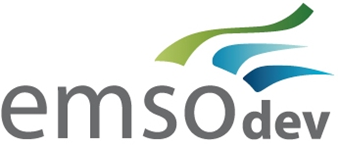
Implementation of an integrated marine monitoring program in compliance with the requirements of the EU Marine Strategy Framework Directive (IMMP-EEA)
The main target of the project was to facilitate the implementation of the Marine Strategy Framework Directive (MSFD, 2008/56/EC) according to the Article 11 concerning the continuous monitoring and the evaluation of the environmental status in the marine areas under the jurisdiction of the Hellenic Republic. According to the requirements of the MSFD (Marine Strategy Framework Directive) implementation in EU waters, Member States (MS) have to complete an initial assessment of their marine waters and to determine their environmental policy. An indicative list of characteristics including physical, chemical and biological features are given in the Directive for the initial assessment of the environmental status.
ΕΥ ΕΛΚΕΘΕ - Συντονιστής Προγράμματος: Leonidas Perivoliotis
Προϋπολογισμός ΕΛΚΕΘΕ: 2.400.000 €
Χρηματοδότηση: EEA
Διάρκεια: 2015 - 2017
ΕΤΤ S.p.A company, acting as the coordinator of the EMODNET PP2 project (contract number MARE/2012/10 Lot 6 Physics – SI2.656795) came into direct contracts with the Regional Data Centers in Europe in order to enrich the existing data volume that would be available to the users. HCMR, acting as the Mediterranean Data Center for distribution of the near real time data from the operational platforms was contracted in order to collect data that were not available through the Med portal.
Προϋπολογισμός ΕΛΚΕΘΕ: 40.000 €
Χρηματοδότηση: ETT
Διάρκεια: 2014 - 2016
The main objective of the MyOcean Follow On project was to operate a rigorous, robust and sustainable Ocean Monitoring and Forecasting component of the pre-operational Copernicus Marine Service delivering ocean physical state and ecosystem information to intermediate and downstream users in the areas of marine safety, marine resources, marine and coastal environment and weather, climate and seasonal forecasting.
Επιστημονικός Υπεύθυνος ΕΛΚΕΘΕ: Dr. Gerasimos Korres
Προϋπολογισμός ΕΛΚΕΘΕ: 90.000 €
Χρηματοδότηση: EU, H2020
Διάρκεια: 2014 - 2015
Λογότυπο:
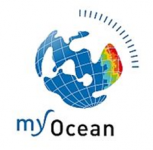
The Fixed Point Open Ocean Observatory network - FixO3
The Fixed Point Open Ocean Observatory network (FixO3) aimed to integrate European open ocean fixed point observatories and to improve access to these key installations for the broader community in order to provide multidisciplinary observations in all parts of the oceans from the air-sea interface to the deep seafloor.
Επιστημονικός Υπεύθυνος ΕΛΚΕΘΕ: Dr. George Petihakis
Προϋπολογισμός ΕΛΚΕΘΕ: 540.000 €
Χρηματοδότηση: EU, H2020
Διάρκεια: 2013 - 2017
Λογότυπο:
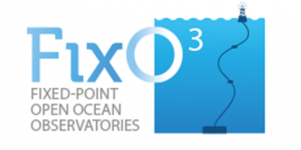
The main objective of DEEP-CO-HOUS was to develop a procedure for optimal designing and manufacturing of composite structural materials to be used in deep sea applications in Greece. The main activities were the development of validated structural study and manufacturing methods for the production of fiber, axisymmetric housings based on advanced composite materials (e.g. Carbon Fiber reinforced materials) for use in large depths (500 to 5000 m). HCMR was participated as the end user testing the materials.
Προϋπολογισμός ΕΛΚΕΘΕ: 62.000 €
Χρηματοδότηση: GR, ESPA-THALES
Διάρκεια: 2013 - 2015
ADAMANT project aimed at quantifying the role of atmospheric deposition of nitrogen (N) and phosphorus (P), as driver for changes in the Mediterranean’s marine productivity, through modeling and experimental investigations. The marine physical / biogeochemical model is forced by an atmospheric chemistry / transport / deposition model. The atmospheric deposition of nutrients and their long-term variability were examined as well as their effect on the oceanic biogeochemistry from preindustrial period to 2100. Results from mesocosm experiments showed that nitrogen and phosphorous atmospheric deposition enhanced primary production. Simulations indicated that atmospheric deposition was significant in the regulation of the unusually high N/P measured in the Mediterranean Sea.
Επιστημονικός Υπεύθυνος ΕΛΚΕΘΕ: Dr. George Petihakis
Προϋπολογισμός ΕΛΚΕΘΕ: 585.000 €
Χρηματοδότηση: GR, ESPA-THALES
Διάρκεια: 2013 - 2015
Λογότυπο:
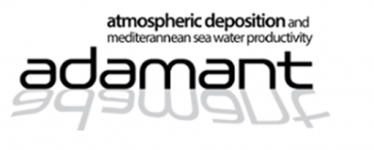
The EU-funded NEREIDS (New service capabilities for integrated and advanced maritime surveillance) project aimed to provide an integrated vision of European maritime policy and surveillance. Specifically, the goal was to enhance European capabilities for automatic ship monitoring in addition to providing advanced decision-making tools.
Επιστημονικός Υπεύθυνος ΕΛΚΕΘΕ: Leonidas Perivoliotis
Προϋπολογισμός ΕΛΚΕΘΕ: 40.000 €
Χρηματοδότηση: EU, FP7
Διάρκεια: 2013 - 2014
EMSO HELLAS was coordinated by the Institute of Oceanography of HCMR and funded by the General Secretariat for Research and Technology (GSRT), Ministry of Education and Religious Affairs and the European Regional Development Fund (ERDF).
The Hellenic Arc is a subduction zone, that is where one tectonic plate “sink” under another one. It is the most tectonically active region in Europe, with a varieties of geo hazards, such as high sismicity, slope instabilities and tsunami. The deep ecosystem is poor in nutrients (oligotrophic) and sensitive to climate change. The region is also on the routes of many cetaceans, that can be monitored through bioacoustic sensors, which are part of the EMSO Regional Facility equipment. The project aimed to enhance the Greek national contribution in the EMSO European Research Infrastructure Consortium (ERIC)
ΕΥ ΕΛΚΕΘΕ - Συντονιστής Προγράμματος: Dr. Vasileios Lykousis
Προϋπολογισμός ΕΛΚΕΘΕ: 3.700.000 €
Χρηματοδότηση: GR, ESPA
Διάρκεια: 2012 - 2015
Λογότυπο:
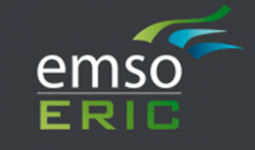
Greek Argo was coordinated by the Institute of Oceanography of HCMR and funded by the General Secretariat for Research and Technology (GSRT), Ministry of Education and Religious Affairs and the European Regional Development Fund (ERDF).
The network of profiling floats aimed to provide for the first time continuous profiles of physical and biochemical parameters of the Greek seas. The use of these data would have short and long term benefits such as more comprehensive surveys of sea water processes and interactions, more reliable in situ data for operational modeling forecast and provide crucial information for climate studies. Apart though from scientific interest the network would give additional socioeconomic benefits as it would upgrade the marine safety forecasting, monitoring of pollution, upgrade of fishery activities and finally management and protection of coastal zone planning and efficient marine and coastal infrastructure. The project aimed to enhance the Greek national contribution in the Euro-Argo European Research Infrastructure Consortium (ERIC).
ΕΥ ΕΛΚΕΘΕ - Συντονιστής Προγράμματος: Dr. Gerasimos Korres
Προϋπολογισμός ΕΛΚΕΘΕ: 780.000 €
Χρηματοδότηση: GR, ESPA
Διάρκεια: 2012 - 2015
Λογότυπο:

KRIPIS-IO was a three years’ project funded by the Greek General Secretariat of Research and Technology aimed to enhance the infrastructures of Research Institutions. The Institute of Oceanography decided to use the major part of the funding to expand the POSEIDON marine observatory’s capacity through the introduction of two autonomous underwater vehicles gliders as well as to enhance the POSEIDON’s forecasting component through the introduction of a new High Performance Computer system.
Προϋπολογισμός ΕΛΚΕΘΕ: 1.500.000 €
Χρηματοδότηση: GR, ESPA
Διάρκεια: 2012 - 2015
Mediterranean Decision Support System for Marine Safety (MEDESS-4MS) was dedicated to the strengthening of maritime safety by mitigating the risks and impacts associated to oil spills. MEDESS-4MS capitalized on existing pan-European frameworks and embraced recent advances and important developments in oceanography in the Mediterranean area. MEDESS-4MS delivered an integrated operational multi model oil spill system in the Mediterranean by gathering and analyzing met-ocean data provided to well established oil spill monitoring and forecasting systems, thus, providing an invaluable tool regarding the early detection and efficient control of the oil spill at early stages. MEDESS-4MS offered a comprehensive and integrated multi-model approach regarding our response to oil spills at sea. The beneficiary countries of MEDESS-4MS are Cyprus, France, Greece, Italy, Malta, Montenegro and Spain.
Επιστημονικός Υπεύθυνος ΕΛΚΕΘΕ: Leonidas Perivoliotis
Προϋπολογισμός ΕΛΚΕΘΕ: 432.000 €
Χρηματοδότηση: Med Programme
Διάρκεια: 2012 - 2015
Λογότυπο:
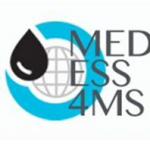
MyWave: The main goal of MyWave was to lay the foundation for a future Marine Core Service that includes ocean waves. The proposal has identified four target areas where concerted research was needed to establish a high quality GMES Marine Core Service for ocean waves: 1. increase the use of earth observations by improving data processing algorithms and data assimilation systems, 2. improve the physics in current wave models and provide a framework for coupled model systems (atmosphere/waves/ocean), 3. establish a new standard for probabilistic wave forecasts based on ensemble methods, 4. derive standard protocols for validation products.
Επιστημονικός Υπεύθυνος ΕΛΚΕΘΕ: Dr. Gerasimos Korres
Προϋπολογισμός ΕΛΚΕΘΕ: 146.000 €
Χρηματοδότηση: EU, FP7
Διάρκεια: 2012 - 2014
Ocean Monitoring and Forecasting (MyOcean 2)
MyOcean 2 was an EU-funded project involving 61 teams in 29 countries in Europe. The main aim of the project was to deliver and operate a sustainable ocean monitoring and forecasting system to users for all marine applications.
Επιστημονικός Υπεύθυνος ΕΛΚΕΘΕ: Dr. Gerasimos Korres
Προϋπολογισμός ΕΛΚΕΘΕ: 625.000 €
Χρηματοδότηση: EU, FP7
Διάρκεια: 2012 - 2014
Λογότυπο:
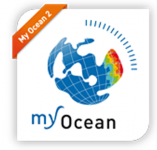
IONIO – IONian Integrated marine Observatory
IONIO was one of the first projects in the Mediterranean initiating a transformation of ocean science toward an integrated marine observatory initiative. IONIO was designed to produce new, persistent, interactive products and services for ocean science. The core activities and the principal objectives of IONIO were collecting real time data, analyzing data, modelling and forecasting the SANI Area.
Επιστημονικός Υπεύθυνος ΕΛΚΕΘΕ: Leonidas Perivoliotis
Προϋπολογισμός ΕΛΚΕΘΕ: 499.000 €
Χρηματοδότηση: INTERREG-III
Διάρκεια: 2012 - 2013
Λογότυπο:
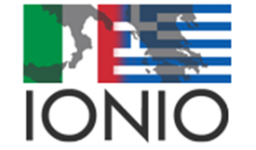
The main objective of JERICO (Joint European Research Infrastructure Network for Coastal Observatories), which proposed a Pan European approach for a European coastal marine observatory network, was to integrate infrastructure and technologies such as moorings, drifters, ferrybox and gliders. Networking activities have led to the definitions of best practices for design, implementation, maintenance and distribution of data of coastal observing systems, as well as the definition of a quality standard. JERICO contributed to the international and global effort on climate change research (GEOSS), to provide coastal data inputs for operational ocean observing and forecasting, and also to answer to some of the needs of the environmental research and societal communities.
Επιστημονικός Υπεύθυνος ΕΛΚΕΘΕ: Dr. George Petihakis
Προϋπολογισμός ΕΛΚΕΘΕ: 712.000 €
Χρηματοδότηση: EU, FP7
Διάρκεια: 2011 - 2015
Λογότυπο:
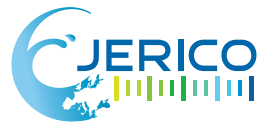
The objective of the GROOM (Gliders for Research, Ocean Observation and Management) project was to design a new European Research Infrastructure that uses underwater gliders for collecting oceanographic data. This new infrastructure would be beneficial for a large number of marine activities and societal applications, which can be related to climate change, marine ecosystems, resources, or security and which rely on academic oceanographic research and/or operational oceanography systems.
GROOM defined the scientific, technological, and legal framework of this European glider capacity. It is a key project for building the required observatory network that would allow the Marine Strategy Framework Directive to be implemented. GROOM developed in line with other European and international initiatives supporting marine in-situ observations, like in particular Euro-Argo, JERICO, and GOOS.
Επιστημονικός Υπεύθυνος ΕΛΚΕΘΕ: Dr. Kostas Nittis
Προϋπολογισμός ΕΛΚΕΘΕ: 85.000 €
Χρηματοδότηση: EU, FP7
Διάρκεια: 2011 - 2014
Λογότυπο:

Strengthening International Dimension of Euro-Argo Research Infrastructure – SIDERI
Objective
The objective of this project was to strengthen the links and integration of the Euro-Argo European research infrastructure into the Argo International strategy of global ocean observations, and to seek participation by, and to develop cooperation with, potential participants in the European neighbouring areas which have a maritime interest.
Επιστημονικός Υπεύθυνος ΕΛΚΕΘΕ: Dr. Gerasimos Korres
Προϋπολογισμός ΕΛΚΕΘΕ: 54.679 €
Χρηματοδότηση: EU,FP7
Διάρκεια: 2011 - 2013
A monitoring and forecasting system for the Eastern Mediterranean Sea with emphasis on climate change and protection of the marine ecosystem
The purpose of the Project was the generation of real time scientific data relevant to the marine ecosystem health and climatic change, with the overall objective of extending the knowledge of environmentally relevant Mediterranean deep sea properties of value to the international scientific community.
ΕΥ ΕΛΚΕΘΕ - Συντονιστής Προγράμματος: Dr. Kostas Nittis
Προϋπολογισμός ΕΛΚΕΘΕ: 1.200.000 €
Χρηματοδότηση: EEA
Διάρκεια: 2010 - 2011
Λογότυπο:

MyOcean project granted by the European Commission within the GMES Program (Seventh Framework Program), whose objective was to define and to set up a concerted and integrated pan-European capacity for ocean monitoring and forecasting. The activities benefit several specified areas of use: Maritime security, oil spill prevention, marine resources management, climate change, seasonal forecasting, coastal activities, ice sheet surveys, water quality and pollution. MyOcean II project followed and ended in 2015, while the services developed during these two projects are now continued by the Copernicus Programme.
MyOcean provided a sustainable service for Ocean Monitoring and Forecasting validated and commissioned by users. The MyOcean information includes observations, analysis, reanalysis and forecasts describing the physical state of the ocean and its primary biogeochemical parameters. It also contributes to research on climate by providing long time-series of reanalysed parameters.
MyOcean developed upgraded European capabilities for reference marine information and provided a wide range of key ocean indicators. In cooperation with national metrological services, the European Environment Agency and the European Maritime Safety Agency (EMSA) amongst others, MyOcean undertook the pre-operational validation of GMES Marine Services, and formally commissioned them.
, http://www.myocean.eu/
Επιστημονικός Υπεύθυνος ΕΛΚΕΘΕ: Dr. Gerasimos Korres
Προϋπολογισμός ΕΛΚΕΘΕ: 720.000 €
Χρηματοδότηση: EU, FP7
Διάρκεια: 2009 - 2012
Λογότυπο:

EuroSITES was a FP7 Collaborative Project which aimed to form an integrated European network of 9 deep-ocean (water depth >1000m) observatories. The EuroSITES network was coordinated by the National Oceanography Centre, Southampton, UK and involves 13 Partners across Europe and the Cape Verde Islands.
EuroSITES has build on the work of FP6 EUR-OCEANS (Work Package 2.1 'Observing Systems') to integrate and enhance the existing European open-ocean observational capacity to encompass the ocean interior, seafloor and subseafloor. EuroSITES produced a more reliable ocean observatory network with common funding streams and data management systems.
Επιστημονικός Υπεύθυνος ΕΛΚΕΘΕ: Dr. George Petihakis
Προϋπολογισμός ΕΛΚΕΘΕ: 340.000 €
Χρηματοδότηση: EU, FP6
Διάρκεια: 2008 - 2011
Λογότυπο:

Euro-Argo was the European project that was funded for the initial design for the transition from the European network of the Argo profiling floats to an ERIC (European Research Infrastructure Consortium) that was happened in 2014.
Επιστημονικός Υπεύθυνος ΕΛΚΕΘΕ: Dr. Gerasimos Korres
Προϋπολογισμός ΕΛΚΕΘΕ: 100.000 €
Χρηματοδότηση: Διάρκεια: 2008 - 2010
Λογότυπο:
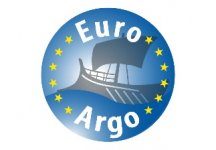
The overall goal of ECOOP (European Coastal-shelf sea operational observing and forecasting system) was to consolidate, integrate and further develop existing European coastal and regional seas operational observing and forecasting systems into an integrated pan-European system targeted at: (i) detecting environmental and climate changes, (ii) predicting their evolution, (iii) producing timely and quality assured forecasts, (iv) providing marine information services (including data, information products, knowledge and scientific advices) and (v) facilitate decision support needs.
During the E – Coop project the existing coastal and regional sea observing (remote sensing, in-situ) networks were integrated into a pan-European observing system as well as existing coastal and regional sea forecasting systems were also integrated into a pan-European forecasting system and assimilate pan-European observation database into the system.
Επιστημονικός Υπεύθυνος ΕΛΚΕΘΕ: Dr. Kostas Nittis
Προϋπολογισμός ΕΛΚΕΘΕ: 710.000 €
Χρηματοδότηση: EU, FP6
Διάρκεια: 2007 - 2009
Λογότυπο:
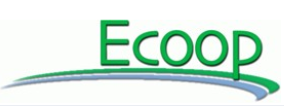
BOSS4GMES (Building Operational Sustainable Services for GMES) was a European Commission funded project aimed at developing sustainable Global Monitoring of Environment and Security (GMES) services. The project was co-ordinated by Infoterra (now Astrium Geo-Information Services)
, https://en.wikipedia.org/wiki/BOSS4GMES
Επιστημονικός Υπεύθυνος ΕΛΚΕΘΕ: Dr. Kostas Nittis
Προϋπολογισμός ΕΛΚΕΘΕ: 230.000 €
Χρηματοδότηση: EU, FP6
Διάρκεια: 2007 - 2009
MarCoast (Marine & Coastal Environmental Information Services) was a three year GMES (Global Monitoring for Environment and Security) project funded by the European Space Agency with the aim of establishing a durable network of marine and coastal information services.
The pilot service that was developed during the ROSES project (2003 – 2004), was completed and run operationally in the frames of MARCOAST project. In the framework of these two projects, a complete service for oil spill monitoring and forecasting was delivered in order to provide forecasts based on satellite oil spill detection in near real time.
Προϋπολογισμός ΕΛΚΕΘΕ: 210.000 €
Χρηματοδότηση: ESA
Διάρκεια: 2005 - 2008
Λογότυπο:

To consolidate the operation, upgrade the functionality and extend the observing & forecasting capacity of the POSEIDON system
ΕΥ ΕΛΚΕΘΕ - Συντονιστής Προγράμματος: Dr. Kostas Nittis
Προϋπολογισμός ΕΛΚΕΘΕ: 10.000.000 €
Χρηματοδότηση: EEA grants
Διάρκεια: 2005 - 2008
Λογότυπο:

Marine Environment and Security for the European Area – Integrated Project
MERSEA aimed to develop a European system for operational monitoring and forecasting on global and regional scales of ocean physics, biogeochemistry and ecosystems.
The project’s strategic objective was to provide an integrated service of global and regional ocean monitoring and forecasting to intermediate users and policy makers in support of safe and efficient offshore activities, environmental management, security, and sustainable use of marine resources. The system that was developed, subsequently constituted a key component of the Ocean and Marine services element of GMES (Global Monitoring for Environment and Security)
Προϋπολογισμός ΕΛΚΕΘΕ: 430.000 €
Χρηματοδότηση: EU, FP5
Διάρκεια: 2004 - 2008
An enhanced operational system for wave monitoring and predictions with applications in Hellenic Navigation
Προϋπολογισμός ΕΛΚΕΘΕ: 380.000 €
Χρηματοδότηση: GR, EPAN
Διάρκεια: 2004 - 2006
The MFSTEP project (Mediterranean Forecasting System Towards Environmental Predictions) has improved the operational forecasting system for the Mediterranean Sea. It has been based upon three main components: a) the Near Real Time Observing system; b) the numerical forecasting systems at basin scale and for regional areas; c) the forecast products dissemination and exploitation system.
Χρηματοδότηση: Διάρκεια: 2003 - 2006
In the framework of the ROSES (Real-Time Ocean Services for Environment and Security) project funded by ESA under the GMES initiative, an integrated service for oil spill detection and forecasting was developed and tested in a pilot phase. The service was implemented in the Central and South Aegean Sea (Greece) and combined the information from SAR image analysis together with state-of-the-art numerical models in order to provide a complete picture of the detection and the evolution of an oil spill in the marine environment. Complete reports for both detection and forecasting processes were available through a dedicated web site to the Greek marine authorities in near real time.
Προϋπολογισμός ΕΛΚΕΘΕ: 90.000 €
Χρηματοδότηση: ESA
Διάρκεια: 2003 - 2004
The MERSEA Strand – 1 project (Marine EnviRonment and Security for the European Area) was directly related to the GMS Action Plan (initial period 2001 – 2003) on global ocean monitoring and the marine theme. It built on the existing European capabilities for development, implementation and operational use of marine modelling and data assimilation systems, spaceborne observations and in situ observing networks and systems. The overall objective was to:
Integrate existing spaceborne observations with data from in situ monitoring networks through ocean modelling, and data assimilation system to : a.) deliver information products (physical, chemical and biological) needed by users concerned with European marine environment and security policies b.) report on the problems met and lessons learnt in suppling this information, and c.) contribute to improve knowledge, methods and tools required for monitoring, information production and delivery to users occupied with marine environmental monitoring, management and security.
Προϋπολογισμός ΕΛΚΕΘΕ: 180.000 €
Χρηματοδότηση: EU, FP5
Διάρκεια: 2003 - 2004
In the European FerryBox Project eleven partners on nine routes were cooperating together to develop and test operational oceanographic systems on ferries and ships of opportunity (FerryBoxes). The objectives were: (1) to show how FerryBoxes can be used for autonomous measurements of environmental parameters, (2) to quantify environmental variability of selected parameters on a European wide scale, (3) to improve the quality of numerical models by assimilation of FerryBox data, (4) to demonstrate the reliability of such systems for monitoring the marine environment at all times of the year and (5) to recommend to the European marine community how future FerryBoxes can be constructed, installed and operated.
Επιστημονικός Υπεύθυνος ΕΛΚΕΘΕ: Dr. Kostas Nittis
Προϋπολογισμός ΕΛΚΕΘΕ: 230.000 €
Χρηματοδότηση: EU, FP5
Διάρκεια: 2002 - 2005
MAMA: Mediterranean network to Assess and upgrade Monitoring and forecasting Activity in the region was a 3-year EU-funded project, with a partnership from all the riparian countries, during which the multi-national network and regional platform for routine marine observations and forecasts in the Mediterranean was established.
Επιστημονικός Υπεύθυνος ΕΛΚΕΘΕ: Dr. Kostas Nittis
Προϋπολογισμός ΕΛΚΕΘΕ: 130.000 €
Χρηματοδότηση: EU,FP5
Διάρκεια: 2002 - 2004
The MARSAIS project (Marine SAR Analysis and Interpretation System) was funded under the EU Fifth Framework Programme (FP5). During the project, a prototype generic Marine SAR Analysis and Interpretation System (MARSAIS) with sufficient product accuracy and optimum resolution for specific application(s) in the coastal and marine environment, was designed and implemented.
Επιστημονικός Υπεύθυνος ΕΛΚΕΘΕ: Dr. Kostas Nittis
Προϋπολογισμός ΕΛΚΕΘΕ: 250.000 €
Χρηματοδότηση: EU, FP5
Διάρκεια: 2001 - 2003
Mediterranean Forecasting System Pilot Project. Funded by EU (FP5 - MAS3-CT98).
The Mediterranean Forecasting system Pilot Project concluded its activities in 2001, achieving the following goals: 1. Realization of the first high-frequency (twice a month) Voluntary Observing Ship (VOS) system for the Mediterranean Sea with XBT profiles for the upper thermocline (0-700 m) and 12 nm along track nominal resolution; 2. Realization of the first Mediterranean Multidisciplinary Moored Array (M3A) system for the Near-Real-Time (NRT) acquisition of physical and biochemical observations. The actual observations consists of: air-sea interaction parameters, upper thermocline (0-500 m) temperature, salinity, oxygen and currents, euphotic zone (0-100 m) chlorophyll, nutrients, Photosinthetically Available Radiation (PAR) and turbidity; 3. Analysis and NRT dissemination of high quality along track Sea Level Anomaly (SLA), Sea Surface Temperature (SST) data from satellite sensors to be assimilated into the forecasting model; 4. Assembly and implementation of a multivariate Reduced Order Optimal Interpolation scheme (ROOI) for assimilation in NRT of all available data, in particular, SLA and VOS-XBT profiles; 5. Demonstration of the practical feasibility of NRT ten day forecasts at the Mediterranean basin scale with resolution of 0.125° in latitude and longitude. The analysis or nowcast is done once a week; 6. Development and implementation of nested regional (5 km) and shelf (2-3 km) models to simulate the seasonal variability. Four regional and nine shelf models were implemented successfully, nested within the forecasting model.
Χρηματοδότηση: Διάρκεια: 1998 - 2001
Development and implementation of an operational monitoring, forecasting and information system for the marine environmental conditions of the Aegean Sea
ΕΥ ΕΛΚΕΘΕ - Συντονιστής Προγράμματος: Dr. George Chronis
Λοιποί εταίροι έργου: Univ. of Athens, Univ. of Thessaloniki, NTUA
Προϋπολογισμός ΕΛΚΕΘΕ: 14.100.000 €
Χρηματοδότηση: EEA grants & national contribution
Διάρκεια: 1997 - 2000
Λογότυπο:
